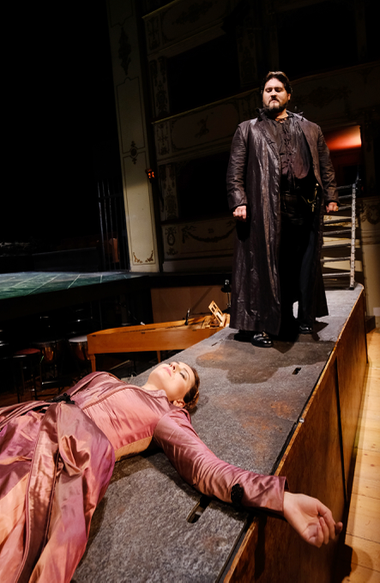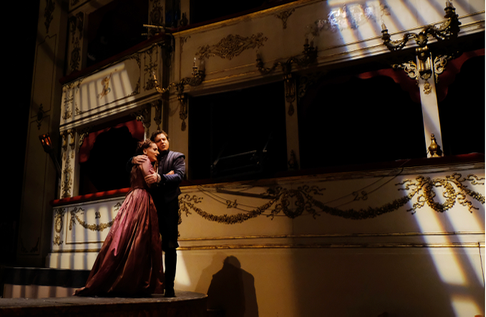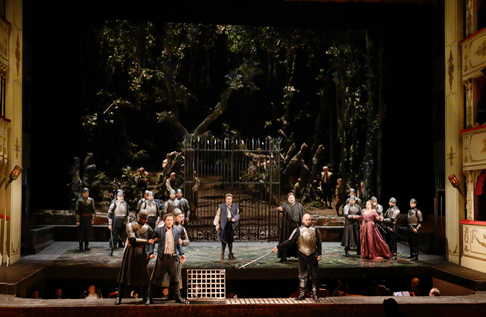Recently in Reviews
English Touring Opera are delighted to announce a season of lyric monodramas to tour nationally from October to December. The season features music for solo singer and piano by Argento, Britten, Tippett and Shostakovich with a bold and inventive approach to making opera during social distancing.
This tenth of ten Live from London concerts was in fact a recorded live performance from California. It was no less enjoyable for that, and it was also uplifting to learn that this wasn’t in fact the ‘last’ LfL event that we will be able to enjoy, courtesy of VOCES8 and their fellow vocal ensembles (more below …).
Ever since Wigmore Hall announced their superb series of autumn concerts, all streamed live and available free of charge, I’d been looking forward to this song recital by Ian Bostridge and Imogen Cooper.
The Sixteen continues its exploration of Henry Purcell’s Welcome Songs for Charles II. As with Robert King’s pioneering Purcell series begun over thirty years ago for Hyperion, Harry Christophers is recording two Welcome Songs per disc.
Although Stile Antico’s programme article for their Live from London recital introduced their selection from the many treasures of the English Renaissance in the context of the theological debates and upheavals of the Tudor and Elizabethan years, their performance was more evocative of private chamber music than of public liturgy.
In February this year, Albanian soprano Ermonela Jaho made a highly lauded debut recital at Wigmore Hall - a concert which both celebrated Opera Rara’s 50th anniversary and honoured the career of the Italian soprano Rosina Storchio (1872-1945), the star of verismo who created the title roles in Leoncavallo’s La bohème and Zazà, Mascagni’s Lodoletta and Puccini’s Madama Butterfly.
Evidently, face masks don’t stifle appreciative “Bravo!”s. And, reducing audience numbers doesn’t lower the volume of such acclamations. For, the audience at Wigmore Hall gave soprano Elizabeth Llewellyn and pianist Simon Lepper a greatly deserved warm reception and hearty response following this lunchtime recital of late-Romantic song.
Collapsology. Or, perhaps we should use the French word ‘Collapsologie’ because this is a transdisciplinary idea pretty much advocated by a series of French theorists - and apparently, mostly French theorists. It in essence focuses on the imminent collapse of modern society and all its layers - a series of escalating crises on a global scale: environmental, economic, geopolitical, governmental; the list is extensive.
For this week’s Live from London vocal recital we moved from the home of VOCES8, St Anne and St Agnes in the City of London, to Kings Place, where The Sixteen - who have been associate artists at the venue for some time - presented a programme of music and words bound together by the theme of ‘reflection’.
'Such is your divine Disposation that both you excellently understand, and royally entertaine the Exercise of Musicke.’
Amongst an avalanche of new Mahler recordings appearing at the moment (Das Lied von der Erde seems to be the most favoured, with three) this 1991 Mahler Second from the 2nd Kassel MahlerFest is one of the more interesting releases.
‘And there was war in heaven: Michael and his angels fought against the dragon; and the dragon fought and his angels, And prevailed not; neither was their place found any more in heaven … that old serpent … Satan, which deceiveth the whole world: he was cast out into the earth, and his angels were cast out with him.’
If there is one myth, it seems believed by some people today, that probably needs shattering it is that post-war recordings or performances of Wagner operas were always of exceptional quality. This 1949 Hamburg Tristan und Isolde is one of those recordings - though quite who is to blame for its many problems takes quite some unearthing.
There was never any doubt that the fifth of the twelve Met Stars Live in Concert broadcasts was going to be a palpably intense and vivid event, as well as a musically stunning and theatrically enervating experience.
‘Love’ was the theme for this Live from London performance by Apollo5. Given the complexity and diversity of that human emotion, and Apollo5’s reputation for versatility and diverse repertoire, ranging from Renaissance choral music to jazz, from contemporary classical works to popular song, it was no surprise that their programme spanned 500 years and several musical styles.
The Academy of St Martin in the Fields have titled their autumn series of eight concerts - which are taking place at 5pm and 7.30pm on two Saturdays each month at their home venue in Trafalgar Square, and being filmed for streaming the following Thursday - ‘re:connect’.
The London Symphony Orchestra opened their Autumn 2020 season with a homage to Oliver Knussen, who died at the age of 66 in July 2018. The programme traced a national musical lineage through the twentieth century, from Britten to Knussen, on to Mark-Anthony Turnage, and entwining the LSO and Rattle too.
With the Live from London digital vocal festival entering the second half of the series, the festival’s host, VOCES8, returned to their home at St Annes and St Agnes in the City of London to present a sequence of ‘Choral Dances’ - vocal music inspired by dance, embracing diverse genres from the Renaissance madrigal to swing jazz.
Just a few unison string wriggles from the opening of Mozart’s overture to Le nozze di Figaro are enough to make any opera-lover perch on the edge of their seat, in excited anticipation of the drama in music to come, so there could be no other curtain-raiser for this Gala Concert at the Royal Opera House, the latest instalment from ‘their House’ to ‘our houses’.
"Before the ending of the day, creator of all things, we pray that, with your accustomed mercy, you may watch over us."
Reviews

29 Aug 2017
Rossini’s Torvaldo e Dorliska in Pesaro
The rare and somewhat interesting Rossini! Torvaldo e Dorliska (1815) comes just after Elisabetta, Regina di Ingleterra (the first of his nineteen operas for Naples) — a huge success, and just before Il barbiere di Siviglia in Rome — a failure.
Already before Torvaldo e Dorliska Rossini had three of his major comedies under his belt (La pietra del paragone, L’italiana in Algeri and Il turco in Italia) and two successful tragedies (Tancredi and Elisabetta).
But Torvaldo e Dorliska is a dramma semiseria — a horse of a quite different color. The genre can stretch finally into operas like maybe Don Giovanni and Rigoletto, but in Rossini’s oeuvre it did not engender any enduring Rossini masterpieces, as have comedy and tragedy — the 2015 Pesaro production of La Gazza Ladra, Rossini's only other semiseria, directed by Damiano Michieletto, definitively finished off its bid for masterpiece status.
Strict semiseria genre norms require a basso buffo, and Torvaldo and Dorliska obliges with the Duke of Ordow, played just now by none other than Nicola Alaimo, Pesaro’s recent William Tell. Mr. Alaimo is a performer of stature and of great presence, and is a powerful singer who evokes sympathy. These attributes confused this current Pesaro edition of,Torvaldo e Dorliska (a remount of its 2006 production directed by Mario Martone).
 Salome Jicia as Dorliska, Dmitry Korchak as Torvaldo
Salome Jicia as Dorliska, Dmitry Korchak as Torvaldo
The Duke of Ordow is smitten by Dorliska, recently married to Torvaldo whom the Duke assumes his thugs have murdered. Not so. The wounded Torvaldo is taken into the Duke’s castle by its gatekeeper. Meanwhile Dorliska, abducted into the castle, is slapped around by the Duke to try to get her to marry him. Everyone rebels against the Duke for various reasons and he is led off to prison.
After all that we were quite confused as we had come to like Mr. Alaimo even though everyone on stage hated him.
Director Mario Martone and his designer Sergio Tramonti set this Polish tale somewhere with lots of thick foliage, all the better to mask his thugs as they came and went, and finally hide the revolutionaries as well. The setting had all the atmospheres of incipient Romanticism. But Rossini’s libretto was largely a farce of the type that plays best under bright lights.
Besides the un-Romantic brutal slapping of Dorliska Mr. Martone offered some extreme, un-Romantic schtick as well — Ormondo, the Duke’s lieutenant climbs a tree singing his aria, and falls out still singing (he was caught by his friends), and as the revolutionary movement gained momentum thousands of "Viva Rossini" leaflets rained down upon us from the auditorium's rafters.
 The entire cast in the Act II finale
The entire cast in the Act II finale
As usual in Pesaro there were fine singers who created this evening of pure delight. Of particular note was young Georgian soprano Salome Jicia as Dorliska who raged and spat in secure Rossinian language, and Russian tenor Dmitry Korchak who delivered Torvaldo with aplomb though missing was an innocence and charm we might have liked in this young lover. Pesaro regular, bass Carlo Lepore convinced us as the duplicitous gatekeeper (we sympathized with his employer). A former participant in the Pesaro’s Accademia Rossiniana, baritone Filippo Fontana was the soldier who fell out of the tree singing.
The greatest pleasures of the evening were being in the Teatro Rossini, a typical Italian horseshoe theater of perfect size for minor Rossini, the able orchestral playing of the Orchestra Sinfonica G. Rossini under conductor Francesco Lanzillotta who found the real Rossini, and most of all it was a lot of fun to have the opportunity to explore the ideals and the potential of opera semiseria in this production of undeniable charm.
Michael Milenski
Cast and production information:
Duca d’Ordow: Nicola Alaimo; Dorliska: Salome Jicia; Torvaldo: Dmitry Korchak; Giorgio: Carlo Lepore; Carlotta: Raffaella Lupinacci; Ormondo: Filippo Fontana. Coro del Teatro della Fortuna M. Agostini; Orchestra Sinfonica G. Rossini. Conductor: Francesco Lanzillotta; Regia: Mario Martone; Scene: Sergio Tramonti; Costumi: Ursula Patzak; Luci: Cesare Accetta. Teatro Rossini, Pesaro, August 18, 2017.
Michael Milenski
Cast and production information:


